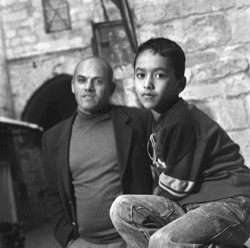Jerusalem Stories
Cross-cultural dialogue is essential for peacebuilding. Finding innovative approaches to such exchange is at the heart of an initiative called Jerusalem Stories, for which USIP was a primary grantor.
This multifaceted effort was designed to harness the power of personal stories and portrait photos to convey a personal perspective on the Israeli-Palestinian conflict. It presents the experiences of a broad variety of Jerusalem residents, focusing on the experience of the “other.” The project consists of many elements, including:
- storytelling performances to present the unique and universal elements of these stories
- story-based dialogue workshops to teach skills of constructing and sharing personal narratives
- photography exhibits with accompanying written narratives
- series of interactive educational programs
- book of personal stories and photographs
- series of articles in Israeli and Palestinian newspapers
- development of peacebuilding tools to share the Jerusalem Stories methodology and lessons learned
- website about the project.

Samir al Jundi, one of the people profiled
in the Jerusalem Stories photo exhibit, is
a storekeeper in Jerusalem’s Old City.
(Photo courtesy Lloyd Wolf)
In a recent visit to USIP in Washington, Grosman stressed that Jerusalem Stories creates a tool for “humanizing, raising awareness and communicating many valid relationships of the city.” A unique feature of the project is that Palestinian and Israeli actors tell each other’s stories during the dialogues. Grosman says this feature allows for a humanized engagement with the stories. “The personal story creates an opportunity to step into the shoes of the other and imagine their world,” she observed.
USIP’s Role
USIP helped to operationalize the project by funding a pilot media program.
Steve Riskin, Senior Grant Program Officer and USIP Middle East specialist noted, “Early on, the Institute recognized the creative and groundbreaking use of media in Grosman’s approach. Jerusalem Stories attempts to grapple with and improve, in a thoughtful and sensitive way, relations among communities in this richly diverse, but deeply divided and contested city. It is an approach that will be applicable for and have resonance in other contentious settings.”
“USIP played an essential role in deciding that this is an idea that should have a chance to be tested,” said Grosman. This initial support catalyzed additional donor funding.
Moreover, the Institute’s emphasis on measurement, lessons learned, and best practices provided a framework to evaluate the project’s success. The framework integrated a number of variables, among them:
- contributing factors to the project’s success
- attendance at Jerusalem stories events
- number of individuals and schools targeted in project outreach
- impact on audience and participants
- recommendations for improvements
Overall, the evaluation recommended that the project continue to grow and develop.